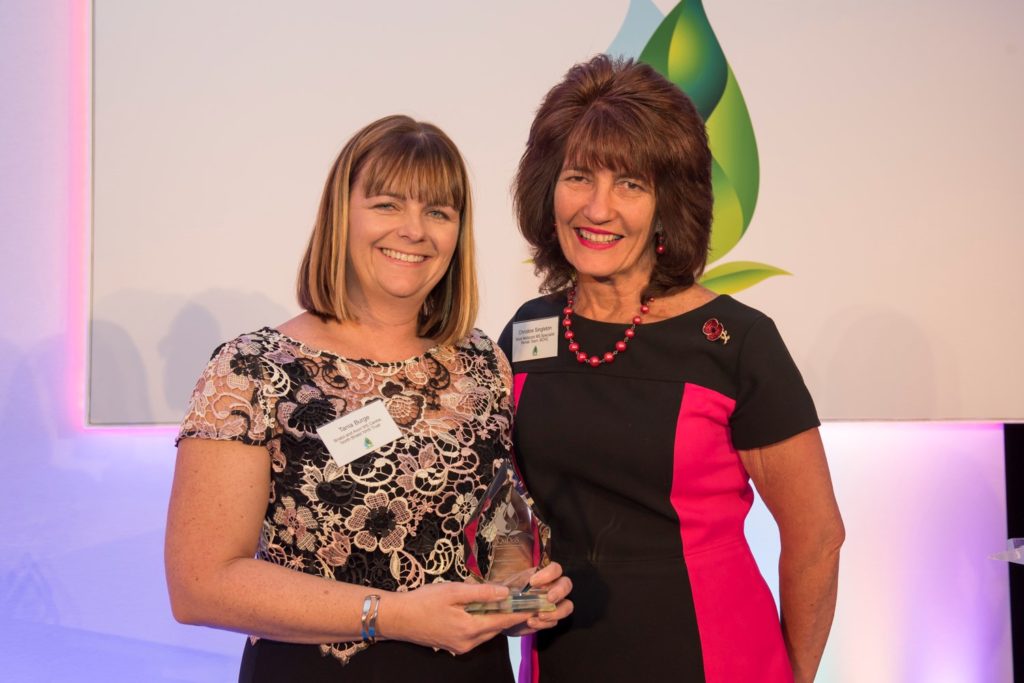
(From left to right: Tania Burge with Christine Singleton, Trustee at the MS Trust and Lead Clinical Physiotherapist at the West Midlands Rehabilitation Centre in Birmingham)
Specialist physiotherapist recognised for specialist MS service
The QuDoS recognition programme, organised by pharmaphorum and the Multiple Sclerosis Trust, recognised the best practice in care. As part of a series of articles profiling the winners, pharmaphorum speaks to Tania Burge, winner of the Outstanding allied health professional category.
Q: Please could you tell me what inspired you to develop the specialist MS physio service in the way that you did?
A: I joined the newly developing Bristol MS team in 2010 as the first MS specialist physiotherapist and wanted to use the opportunity to provide a responsive and innovative service.
It was very important to me for the service to meet the needs of the very wide presentation of problems seen in people with MS. Specialist services are difficult to maintain and develop in a climate of NHS austerity. In order to develop services, I have aimed to address key areas of treatment to meet the varied needs of all my patients.
I have used both routine service resources and alternative charitable funding routes to support a range of new exercise programmes based in local leisure centres alongside specialist services delivered within the NHS. This combination of hospital and community based resources offers wider opportunities to manage this difficult long-term condition.
Q: Please could you outline how the service works?
A: Working with other members of the MS team and using outreach to other departments, such as orthotics and specialist rehabilitation, I have developed specialist services for spasticity, mobility, and joint orthotic clinical sessions.
The community based services have been developed in partnership with gym and swim instructors in community resources to develop group rehabilitation activities addressing gait, balance and fitness with peer support. Those with high level balance capacity join gym-based circuit classes suited to their individual capability and needs, while those with poorer balance and mobility who require a walking aid are offered aqua therapy classes to improve balance and mobility. Both services offer a follow-on opportunity to attend regularly to exercise under the guidance of specially trained staff.
Regular one-to-one specialist physiotherapy reviews are carried out and since 2016 the appointment of an MS assistant practitioner with a background in exercise science has enabled further expansion of one-to-one services and rehabilitation groups.
The team now incorporates sports instructors with a variety of backgrounds including sports science, personal trainers and swim instructors thus developing the rehabilitation team. The collaboration of working with a background of professionals has enhanced the management of people with MS.
I also train and mentor other physiotherapists, gym, and swim instructors and members of the multi-disciplinary team and have presented initiatives and knowledge at national and international conferences
Q: What feedback have you had from patients?
A: Patients have been very positive and appreciative of the services we offer. Several have carried out sponsored events to help support the charitable funding of the services that they have found vital to manage their symptoms, improve quality of life and increase social interaction. The patients also continue to attend for independent and group exercise, which shows they value service.
Q: How do you plan to develop the service?
A: I plan to continue to develop services to address the therapeutic management of more complex MS patients to improve the coordination of care of those with advanced MS symptoms. The development of the service has allowed me to present a successful business case for the MS assistant practitioner to work alongside me to expand the services for patients.
The post holder continues to develop her capabilities, giving people an expanded service with increased rehabilitation opportunities to meet their needs.
This allows her to respond to urgent demands of MS relapse management and to progressive deterioration thus ensuring patients can maximise their function and independence.
Q: What are your future plans for professional development?
A: I am studying for an MSc in advanced neurological rehabilitation and after each assignment I reflect on practice and can use new evidence that I find in my studies to support changes in clinical delivery.
Q: What did it mean to you to win the award?
A: I was delighted to be awarded ‘Outstanding Allied Health Professional’. I work in a very competitive field of professionals, so this means a huge amount to me. Working in the NHS can be challenging and extremely busy so to have all the hard work recognised is wonderful. I was very pleased to be shortlisted and selected as the winner.
Q: How did attending the award ceremony benefit you professionally?
A: There were many opportunities to network with other professional and discuss their services and challenges, so we can learn from each other.
The twitter updates during the QuDoS recognition ceremony linking with my local Trust also meant patients could see the evening progress. When I returned to work to run my services patients’ feedback was amazing.